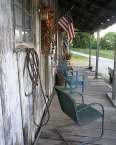 Wednesday, May 12, 1999, Gravel Switch, Kentucky -
"By the time I was tall enough to look over the counter," Alma Lane tells me, "I was working here." By "here" she means Penn's Store, the oldest, family run country store in this country. By "the time" she means 1925, when her name was Tincy Penn. And by "work" she means more than topping the bottom line, but being an integral part of her community.
Wednesday, May 12, 1999, Gravel Switch, Kentucky -
"By the time I was tall enough to look over the counter," Alma Lane tells me, "I was working here." By "here" she means Penn's Store, the oldest, family run country store in this country. By "the time" she means 1925, when her name was Tincy Penn. And by "work" she means more than topping the bottom line, but being an integral part of her community.
 Country stores have always been more than simply a place to buy supplies; they have served as the center of town, as a place where you could sit and talk with your neighbors, relax before or after work, plan your day or season, and just basically, keep your life running smoothly. They have largely been replaced by "convenience" stores, with "fuel islands" where you can pay at the pump, and never even see the person behind the counter. But there are still thousands of family owned markets around this country, from the Italian deli and market on 38th street, in Brooklyn, to the Penn Store, close enough to the middle of nowhere to feel the vacuum.
Country stores have always been more than simply a place to buy supplies; they have served as the center of town, as a place where you could sit and talk with your neighbors, relax before or after work, plan your day or season, and just basically, keep your life running smoothly. They have largely been replaced by "convenience" stores, with "fuel islands" where you can pay at the pump, and never even see the person behind the counter. But there are still thousands of family owned markets around this country, from the Italian deli and market on 38th street, in Brooklyn, to the Penn Store, close enough to the middle of nowhere to feel the vacuum.
 Let the screen door slam behind you, walk across the tin-covered, yellow poplar floor, and have a seat in one of the half dozen wooden chairs around the Warm Morning coal stove, for a ride back in time. Talk about cars, and you could be talking about the invention thereof, talk about a civil war, and you could be talking about our own. In fact, conversations around this stove have covered several wars, many generations and nearly three centuries.
Let the screen door slam behind you, walk across the tin-covered, yellow poplar floor, and have a seat in one of the half dozen wooden chairs around the Warm Morning coal stove, for a ride back in time. Talk about cars, and you could be talking about the invention thereof, talk about a civil war, and you could be talking about our own. In fact, conversations around this stove have covered several wars, many generations and nearly three centuries.
|
Through the Years*
Penn Store was established in the community of Rolling as early as 1845, by William Spragens. In 1850, Gabriel Jackson Penn took over (generation #1) and it has been in his family ever since. Though the store is taking on a whole new character these days, it still looks very much as it has for a century and a half.
Two decades later, in 1870, Penn transferred the store to his oldest son, Martin Wilson Penn (Gen #2) who installed a U.S. post office. The post office was destroyed by a fire the next year, but Penn kept the store open, selling; fabrics, sewing notions, lamps, kerosene, farm supplies, hides and other necessities.
Penn's son, Dick Penn (Gen #3) took over after the turn of the 20th century, and gave the store some flair, selling herbs and patent medicines, practicing medicine and dentistry - he even sold a cure for skin cancer. Dick's son, Martin (Gen #4) ran the store until the depression in the 1930's, when some of his ten sons took over.
Martin Haskell Penn (Gen #5) ran the place beginning in the 1970's until 1993, when his sister, Alma continued the tradition. Alma's daughter, Jeanne (Gen #6) is organizing events for the store, and her daughter, Dava (Gen #7) hopes to be the next proprietor.
*From Penn family archives.
|
Serving the needs of the community meant a lot to the Penn store, as it has historically been the only source of supplies for the residents of Gravel Switch, who are mostly descendants of pioneers. Through the years, the store had everything from a smokehouse to a chicken coop. It offered for sale everything from sugar, salt, tobacco, crackers, shoes, overalls, nails and barbed wire, to chickens, eggs, ducks and furs (rabbit, raccoon, possum, skunks...) and accepted many of these as payment, even through the 1980's.
You will go far out of your way to visit Penn's Store (take 127 south of Danville, 78 west to 243 north, look for the sign that people keep stealing, and take a left over the small bridge. The store is at the end of that road.) 150 years ago, however, it was in a busy place; where the North Rolling Fork River and Little South Creek met. The stop was popular with travelers who would ride their horses along rivers for navigation and water. Through the years, the store was in the center of activity - around it, people would play baseball, basketball, horseshoes or whatever game they could scare up, and "Sunday meetings" were held in the sycamore grove, next to the river.
 Traditionally, you could count on the Penn's Store being open at 6 a.m., when you needed to get your supplies before your morning in the fields, but today, the hours are a bit more relaxed; "I don't mean to be a smart aleck," Alma says, stuffing a few bills into the cigar box cash register. "But it opens when I get here, and it closes when I leave."
Traditionally, you could count on the Penn's Store being open at 6 a.m., when you needed to get your supplies before your morning in the fields, but today, the hours are a bit more relaxed; "I don't mean to be a smart aleck," Alma says, stuffing a few bills into the cigar box cash register. "But it opens when I get here, and it closes when I leave."
 Penn's Store borders two dry counties, so prohibition didn't affect sales here, at least, not legal sales. In 1930, Alma remembers selling their first Coca-Cola in bottles, chilled in ice, as they had no electricity. During the depression, the Penns went through the same hard times as their customers, but they still extended credit, and they bartered for chickens, furs and other items. During WWII, meat was rationed and and even the Penns needed coupons for supplies.
Penn's Store borders two dry counties, so prohibition didn't affect sales here, at least, not legal sales. In 1930, Alma remembers selling their first Coca-Cola in bottles, chilled in ice, as they had no electricity. During the depression, the Penns went through the same hard times as their customers, but they still extended credit, and they bartered for chickens, furs and other items. During WWII, meat was rationed and and even the Penns needed coupons for supplies.
Country stores were mostly for men, as women would be home caring for the children. If a family owned a car, they only owned one, and the men were the ones to drive it. So, the Penn Store was where men worked and played, sat out rainstorms and hid from the afternoon Sun, they talked and joked and sometimes whiled away the hours. Women might come in for sewing notions or groceries, but they were not known for taking a chair, putting their feet up on the wood stove and shooting the bull through the afternoon.
In the 1950's factories replaced farming jobs, and cars took people into the cities for supplies, and today, the Penn Store is not nearly as vital to the town as it once was. Alma Penn Lane (she no longer goes by "Tinsy", except with old friends) worked here occasionally, but her brothers ran the store, until 1993, when Haskell Penn died, and she took over. Now, for the first time in its history, Penn's Store is owned and managed by women, a factor which has changed its character.

Jeanne Penn Lane
|
In the early 1990's, female members of the Penn families began working at the store regularly. With no bathroom facilities for them, they decided to build an outhouse, and to christen the new facility with a party. Jeanne Penn Lane, working in Nashville at the time, arranged for Chet Atkins to perform for a dedication ceremony, which attracted some 4,000 people and the national media. They now hold outhouse races each year, as well as several others, such as a Christmas event, and a writers gathering.
With their talent and education, these latest generations of the family could abandon the store and work wherever they chose, but Dava Jones, Alma Lane's granddaughter, is choosing to stay right here. "We have something no one else will ever have," she says. "We have the oldest store in the country." She intends to continue that legacy, even though "you have to not want to make a lot of money," she says.
Why would anyone want to run a family business that is miles from civilization and is threatened with a lifetime of red ink? The answer lies in the quality of life, and the quality this store has provided her life. Dava Jones reflects on why she intends to stay, and why so many of the Penns have literally lived and even died under this roof. The seventh generation member in this historic family comes out on the yellow poplar porch, under the tin awning battered by years of overzealous delivery drivers, and simply sums up the lifestyle of a small town grocery store owner. "You know," she says, casting her eyes over the old ball field and along the wooded bluff. "The best times of my life were spent here."